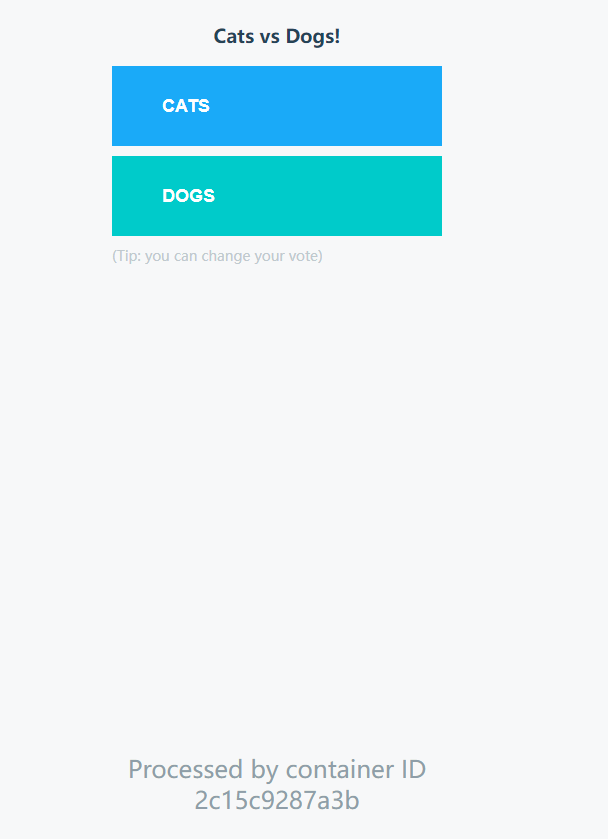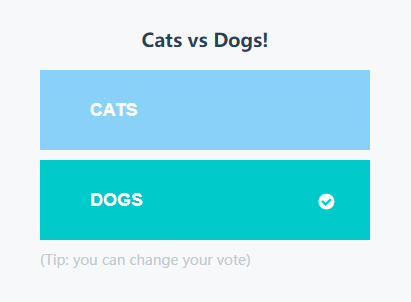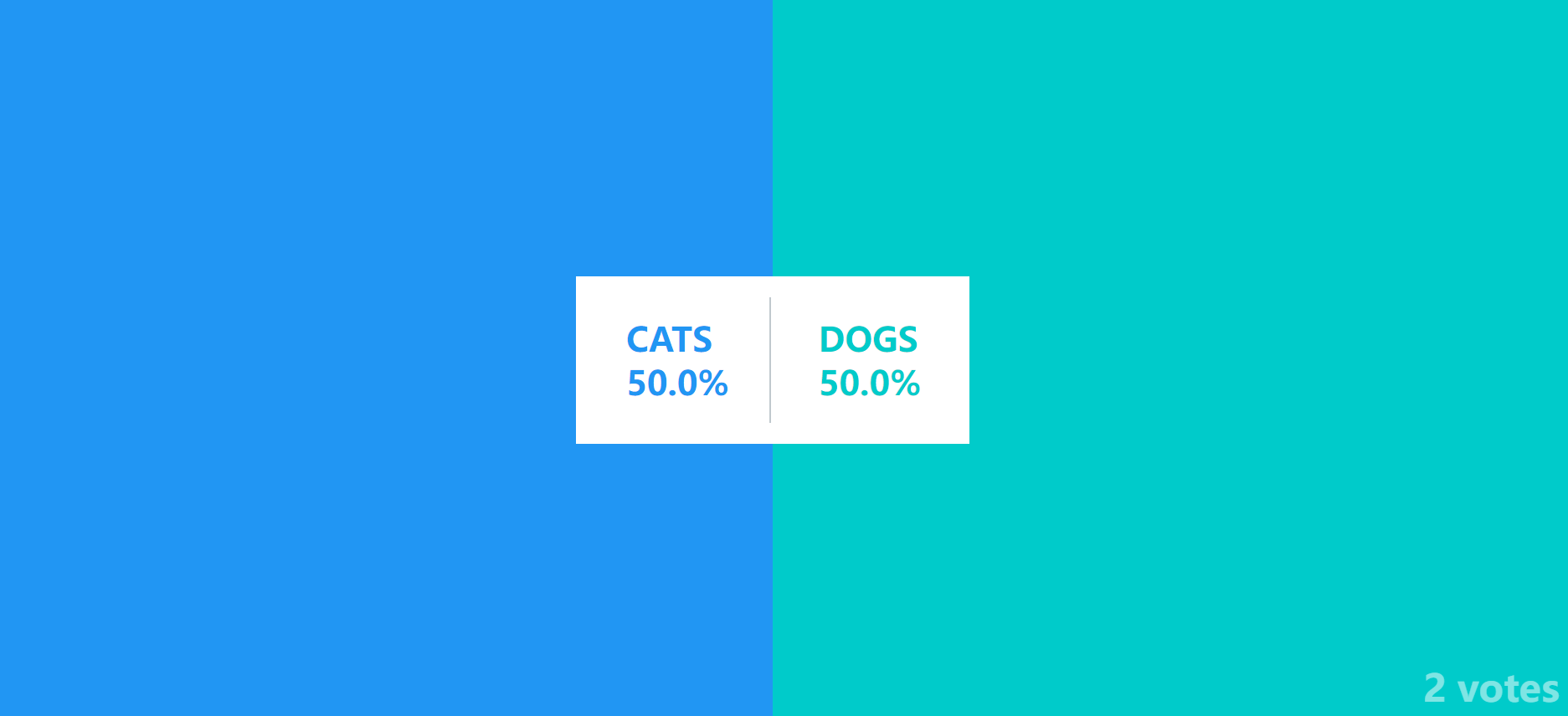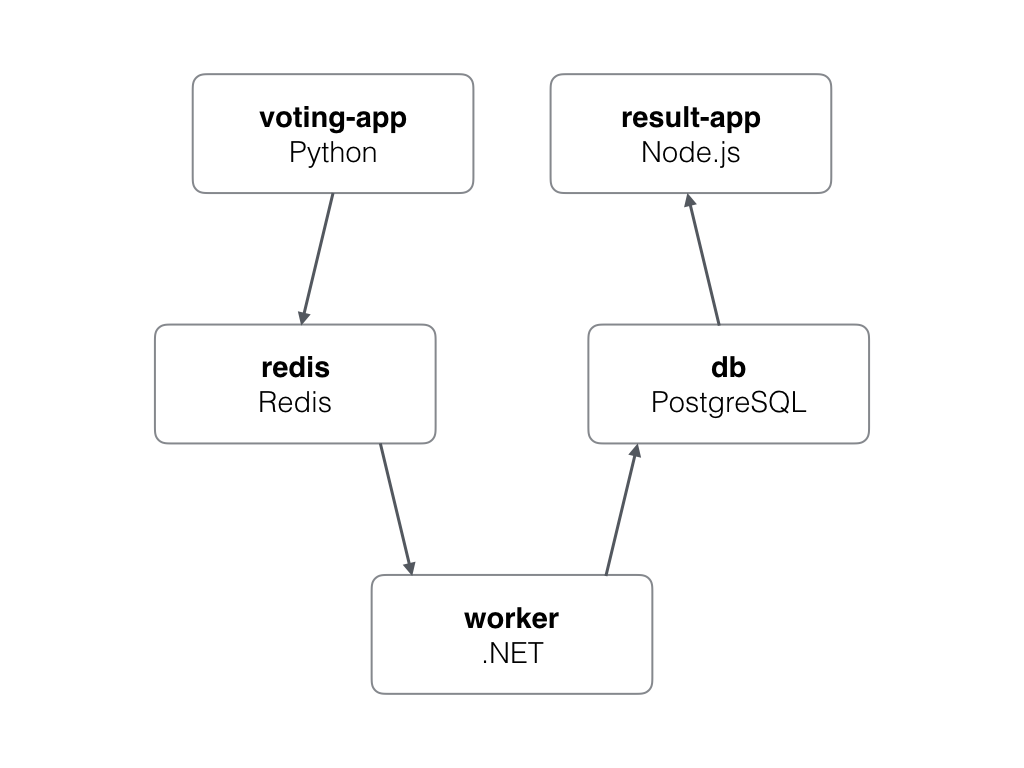Docker Compose classic example: Example Voting App
GitHub address: https://github.com/dockersamples/example-voting-app
For students with poor network, I have downloaded the source code, address: https://download.csdn.net/download/weixin_48447848/77354937
Example Voting App
Simple distributed applications running across multiple Docker containers.
preparation in advance
Download Docker Desktop for Mac or Windows. Docker Compose will be installed automatically. On Linux, make sure you have the latest version of Compose.
Linux container example
Linux stack uses Python, node js,. NET Core (or optional Java) uses Redis for message delivery and Postgres for storage.
If you use Docker Desktop on Windows, you can run the Linux version or the Windows container version by switching to the Linux container.
Run in this directory:
docker-compose up
The application will http://localhost:5000 Run, the results will be http://localhost:5001 .
Or, if you want to run it on Docker Swarm, first make sure you have a swarm. If not, run:
docker swarm init
Once you have your swarm, run it in this directory:
docker stack deploy --compose-file docker-stack.yml vote
Start the operation again
Download source code: https://download.csdn.net/download/weixin_48447848/77354937
View and explain
example-voting-app/docker-compose.yml
Analysis content:
There are a total of 5 containers to create:
- vote voting service
- result view voting results in the background
- worker consuming vote service
- redis is used for message queuing
- db database
volumes: Mount storage space DB data
Networks: two docker networks, front tier and back tier
# version is now using "compose spec"
# v2 and v3 are now combined!
# docker-compose v1.27+ required
services:
vote:
build: ./vote
# use python rather than gunicorn for local dev
command: python app.py
depends_on:
redis:
condition: service_healthy # The void service depends on the redis health status
volumes:
- ./vote:/app
ports:
- "5000:80"
networks:
- front-tier
- back-tier
result:
build: ./result
# use nodemon rather than node for local dev
command: nodemon server.js
depends_on:
db:
condition: service_healthy # The result service depends on the health status of the db database
volumes:
- ./result:/app
ports:
- "5001:80"
- "5858:5858"
networks:
- front-tier
- back-tier
worker:
build:
context: ./worker
depends_on:
redis: # The worker service depends on redis and DB health status
condition: service_healthy
db:
condition: service_healthy
networks:
- back-tier
redis:
image: redis:5.0-alpine3.10
volumes:
- "./healthchecks:/healthchecks"
healthcheck:
test: /healthchecks/redis.sh # Detect the script and execute it every five seconds
interval: "5s"
ports: ["6379"]
networks:
- back-tier
db:
image: postgres:9.4
environment:
POSTGRES_USER: "postgres"
POSTGRES_PASSWORD: "postgres"
volumes:
- "db-data:/var/lib/postgresql/data"
- "./healthchecks:/healthchecks"
healthcheck:
test: /healthchecks/postgres.sh # Health detection script
interval: "5s"
networks:
- back-tier
volumes:
db-data:
networks:
front-tier:
back-tier:
example-voting-app/vote/Dockerfile
Front desk voting service
# Using official python runtime base image
FROM python:3.9-slim
# add curl for healthcheck
RUN apt-get update \
&& apt-get install -y --no-install-recommends \
curl \
&& rm -rf /var/lib/apt/lists/*
# Set the application directory
WORKDIR /app
# Install our requirements.txt
COPY requirements.txt /app/requirements.txt
RUN pip install -r requirements.txt
# Copy our code from the current folder to /app inside the container
COPY . .
# Make port 80 available for links and/or publish
EXPOSE 80
# Define our command to be run when launching the container
CMD ["gunicorn", "app:app", "-b", "0.0.0.0:80", "--log-file", "-", "--access-logfile", "-", "--workers", "4", "--keep-alive", "0"]
example-voting-app/result/Dockerfile
View the voting results in the background, node Dockerfile of JS service
FROM node:10-slim
# add curl for healthcheck
RUN apt-get update \
&& apt-get install -y --no-install-recommends \
curl \
&& rm -rf /var/lib/apt/lists/*
# Add Tini for proper init of signals
ENV TINI_VERSION v0.19.0
ADD https://github.com/krallin/tini/releases/download/${TINI_VERSION}/tini /tini
RUN chmod +x /tini
WORKDIR /app # Enter app directory
# have nodemon available for local dev use (file watching)
RUN npm install -g nodemon
COPY package*.json ./
RUN npm ci \
&& npm cache clean --force \
&& mv /app/node_modules /node_modules
COPY . . # Copy the code from the current folder to / app in the container
ENV PORT 80
EXPOSE 80
CMD ["/tini", "--", "node", "server.js"]
example-voting-app/worker/Dockerfile
FROM mcr.microsoft.com/dotnet/core/sdk:3.1 as builder WORKDIR /Worker COPY src/Worker/Worker.csproj . RUN dotnet restore COPY src/Worker/ . RUN dotnet publish -c Release -o /out Worker.csproj # app image FROM mcr.microsoft.com/dotnet/core/runtime:3.1 WORKDIR /app ENTRYPOINT ["dotnet", "Worker.dll"] COPY --from=builder /out .
Health detection script example voting app / healthchecks/
postgres.sh database service detection script
#!/bin/bash
set -eo pipefail
host="$(hostname -i || echo '127.0.0.1')"
user="${POSTGRES_USER:-postgres}"
db="${POSTGRES_DB:-$POSTGRES_USER}"
export PGPASSWORD="${POSTGRES_PASSWORD:-}"
args=(
# force postgres to not use the local unix socket (test "external" connectibility)
--host "$host"
--username "$user"
--dbname "$db"
--quiet --no-align --tuples-only
)
if select="$(echo 'SELECT 1' | psql "${args[@]}")" && [ "$select" = '1' ]; then
exit 0
fi
exit 1
redis.sh detection script
#!/bin/sh set -eo pipefail host="$(hostname -i || echo '127.0.0.1')" if ping="$(redis-cli -h "$host" ping)" && [ "$ping" = 'PONG' ]; then exit 0 fi exit 1
implement
Select docker - compose YML file
docker-compose -f .\docker-compose.yml up -d
Wait for pull and build, hundreds of lines of input, omit
View container creation
PS C:\Users\Cypress fir\Downloads\example-voting-app-master> docker-compose ps
Name Command State Ports
------------------------------------------------------------------------------------------------------------------------
example-voting-app-master_db_1 docker-entrypoint.sh postgres Up (healthy) 5432/tcp
example-voting-app-master_redis_1 docker-entrypoint.sh redis ... Up (healthy) 0.0.0.0:3161->6379/tcp
example-voting-app-master_result_1 docker-entrypoint.sh nodem ... Up 0.0.0.0:5858->5858/tcp,
0.0.0.0:5001->80/tcp
example-voting-app-master_vote_1 python app.py Up 0.0.0.0:5000->80/tcp
example-voting-app-master_worker_1 dotnet Worker.dll Up
PS C:\Users\Cypress fir\Downloads\example-voting-app-master>
Port 5000 voting service
View voting results on port 5001
Access browser http://127.0.0.1:5000/ Vote.
The same IP and browser are considered as one user. You can't vote repeatedly. You can open several different browsers, such as Chrome, Firefox, Edge, etc


Access browser http://127.0.0.1:5001/ View the voting results.
CATS and DOGS, one for each effect:

Architecture

- A Python or ASP Net core allows you to vote between two options
- A Redis or NATS message queue used to collect new votes
- One NET Core, Java or NET Core 2.1, Worker consumes votes and stores them in
- A database that uses Docker volume to mount Postgres or TiDB
- A node js or ASP. Net core signalr Web App that displays voting results in real time
be careful
The voting application accepts only one vote per customer. If the customer has submitted a vote, it will not register to vote.
This is not a reasonably structured and well-designed distributed App example... It is just a simple example of various types of fragments and languages (queues, persistent data, etc.) and how to process them in Docker.